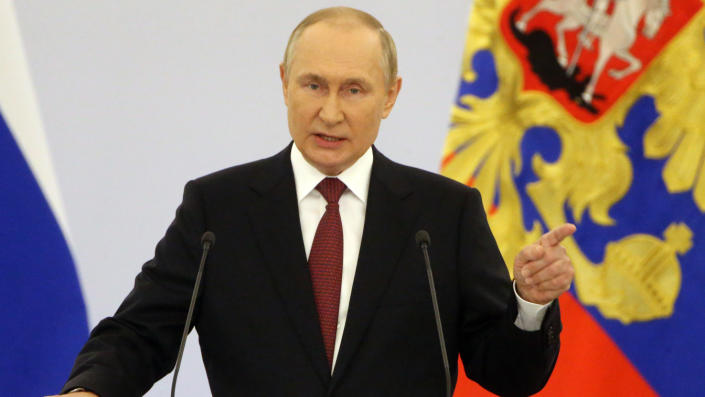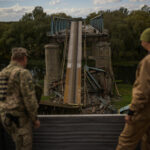WASHINGTON — If Russian President Vladimir Putin makes good on his threat to use nuclear weapons in Ukraine, the United States would likely respond with a sweeping economic embargo combined with a massive conventional attack on Russian military positions that could quickly wipe out the Russian president’s invading military forces, said Joseph Cirincione, a national security analyst and leading expert on nuclear warfare.
The U.S. and NATO “could destroy the Russian forces in Ukraine in a matter of days,” said Cirincione, author of the book “Nuclear Nightmares: Securing the World Before It Is Too Late,” in an interview on the Yahoo News “Skullduggery” podcast. “That would be the end of the Russian army in this.”
But Cirincione also acknowledged that such a direct U.S. or NATO military strike against the Russian military — even in response to the Russian use of tactical nuclear weapons on the battlefield — could also spiral out of control. “There are no good responses once you start down the nuclear path,” he said. “It’s extremely difficult to terminate it for the same reason that a poker player losing a hand is hesitant to fold. They keep thinking there’s one more move they could make, one more bet they could raise to try to cause the other side to fold. So there’s no good responses.”
Cirincione said that if Putin were to actually make good on his threat to go nuclear, it would not be a large-scale thermonuclear bomb attack, but a more limited deployment of tactical weapons — far more limited in scope but still a major and unprecedented escalation. And Cirincione said that the U.S. military response would not be limited to the battlefield. There would also likely be a sharp escalation in psychological warfare such as was used to unnerve Iraqi generals on the eve of the U.S. invasion of that country. “The U.S. was calling Iraqi generals in their home and telling them to stand down. And they did that for two reasons. One, to let them know we know where you live, right? Two, we can reach out and touch you,” said Cirincione, predicting that the U.S. might well adopt such a tactic in the Ukraine crisis.
White House national security adviser Jake Sullivan said that U.S. officials have warned that the Russians there would suffer “catastrophic consequences” if they used nuclear weapons, though he did not without specify what those were.
But even as Sullivan has gone public on the issue, Cirincione acknowledged that the threats have not deterred Putin from talking up a nuclear scenario. Last Friday, Putin gave a speech at the Kremlin in which he announced the annexation of four regions of Ukraine mostly occupied by Russia but where it is getting pushed back by Kyiv’s forces. Putin said that Russia would use “all means available” to defend its territory. In a chilling passage, he noted that the United States was the only country to use nuclear weapons in wartime — dropping atomic bombs on Hiroshima and Nagasaki towards the end of World War II — and then added: “By the way, they created a precedent.”
When asked about the fact that U.S. warnings have not in any way curbed Putin’s talk of nuclear weapons, Cirincione replied: “It tells me that he’s desperate and he’s convinced of his own power and that the pressure on him is not enough yet. So you’re absolutely right. He hasn’t stopped. Would he really do this? I think the answer to that is we don’t know.”
But one reason to be alarmed, said Cirincione, is that Russian military doctrine now explicitly contemplates the use of nuclear weapons, not just to respond to a nuclear attack on the country, but also in the event of a large-scale conventional military attack that endangers Russia’s national security. “They call this strategy ‘escalate to deescalate,’” said Cirincione. “We will use a nuclear weapon in a variety of ways.” As the Russians see it, if they used tactical nuclear weapons in such a scenario, they would argue: “‘We won’t be starting a nuclear war. We’ll be ending a conventional war,’” said Cirincione. “That’s how their thinking goes. And that’s why you have to worry about this more and more as Putin continues to lose the war in Ukraine. It’s exactly in these kinds of circumstances that the use of nuclear weapons comes into play in doctrine and in Putin’s thinking.”
“I consider Putin a fascist,” he added. “I think he has built a fascist regime in Russia. We have never seen a fascist regime with nuclear weapons before. We’ve had authoritarians. We’ve had some brutal dictators, but nothing on this scale before. So this is very dangerous territory.”




